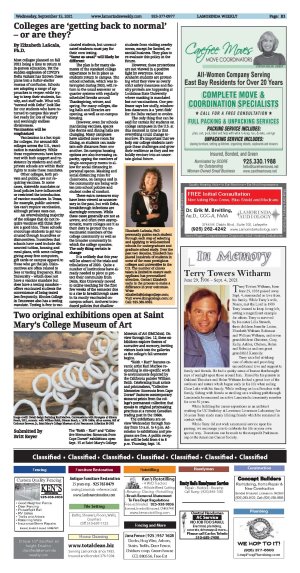|
|
Published September 15th, 2021
|
Colleges are 'getting back to normal' - or are they?
|
| By Elizabeth LaScala, Ph.D. |
|
 |
| Elizabeth LaScala, PhD personally guides each student through each step of selecting and applying to well-matched schools for undergraduate and graduate school study. Over the past two decades, Elizabeth has placed hundreds of students in some of the most prestigious colleges and universities in the U.S. The number of clients taken is limited to ensure each applicant has personalized attention. Contact Elizabeth early in the process to make a difference in your outcomes. Write elizabeth@doingcollege.com; Visit www.doingcollege.com; or Call: 925.385.0562. |
Most colleges planned on fall 2021 being a time to return to in-person education. Yet the sudden explosion of COVID's Delta variant has thrown these plans into a helter-skelter morass of confusion. Schools are adopting a range of approaches to reopen while trying to keep their students, faculty, and staff safe. What will "normal with Delta" look like for our students who have returned to campus this year? Get ready for lots of variety and seemingly endless divisiveness.
 Vaccination will be emphasized
Vaccination will be emphasized
 Vaccination is a hot topic for colleges. For around 600 colleges across the U.S., vaccination is mandatory. While these requirements have been met with both support and resistance by students and staff, private schools are within their rights to make these mandates.
Vaccination is a hot topic for colleges. For around 600 colleges across the U.S., vaccination is mandatory. While these requirements have been met with both support and resistance by students and staff, private schools are within their rights to make these mandates.
 Other colleges, both private and public, are not requiring vaccines. In some cases, statewide mandates or local policies have influenced or restricted the introduction of vaccine mandates. In Texas, for example, public universities can't require vaccination, although private ones can.
Other colleges, both private and public, are not requiring vaccines. In some cases, statewide mandates or local policies have influenced or restricted the introduction of vaccine mandates. In Texas, for example, public universities can't require vaccination, although private ones can.
 An overwhelming majority of the colleges that do not require vaccines still think they are a good idea. These schools encourage students to get vaccinated through incentives or disincentives. Incentives that schools have used include discounted tuition, housing and meal plans, with some colleges giving away free computers, gift cards or campus apparel to those who get the jab. Disincentives are often related to fees or testing frequency. Rice University - which does not have a vaccine mandate but does have a testing mandate - offers vaccinated students the convenience of being tested less frequently. Rhodes College in Tennessee also has a testing mandate. Testing is free to vaccinated students, but unvaccinated students must pay for their own testing.
An overwhelming majority of the colleges that do not require vaccines still think they are a good idea. These schools encourage students to get vaccinated through incentives or disincentives. Incentives that schools have used include discounted tuition, housing and meal plans, with some colleges giving away free computers, gift cards or campus apparel to those who get the jab. Disincentives are often related to fees or testing frequency. Rice University - which does not have a vaccine mandate but does have a testing mandate - offers vaccinated students the convenience of being tested less frequently. Rhodes College in Tennessee also has a testing mandate. Testing is free to vaccinated students, but unvaccinated students must pay for their own testing.
 "Same as usual" will likely be different
"Same as usual" will likely be different
 The plan is for many elements of the standard college experience to be in place as students return to campus. The school schedule, which was interrupted during 2020, will return to the usual semester or quarter systems with regularly scheduled breaks around Thanksgiving, winter, and spring. For many colleges, dining halls and libraries are opening, as well as on-campus housing.
The plan is for many elements of the standard college experience to be in place as students return to campus. The school schedule, which was interrupted during 2020, will return to the usual semester or quarter systems with regularly scheduled breaks around Thanksgiving, winter, and spring. For many colleges, dining halls and libraries are opening, as well as on-campus housing.
 However, even for schools mandating vaccines, spaces like dorms and dining halls are changing. Many campuses have allotted more room for dining, so students can maintain safe distances from one another. On-campus housing options are also increasing capacity, upping the numbers of single-occupancy rooms to allow for social distancing in personal spaces. Masking and social distancing rules for classrooms, on campus and in the community are being written into school policies and student codes of conduct.
However, even for schools mandating vaccines, spaces like dorms and dining halls are changing. Many campuses have allotted more room for dining, so students can maintain safe distances from one another. On-campus housing options are also increasing capacity, upping the numbers of single-occupancy rooms to allow for social distancing in personal spaces. Masking and social distancing rules for classrooms, on campus and in the community are being written into school policies and student codes of conduct.
 These extra measures may have been viewed as unnecessary in the past, but with Delta, breakthrough infections are alarmingly common. While these cases generally are not as severe, and often even asymptomatic, many colleges see it as their duty to protect the unvaccinated members of the college community as well as the broader community in which the college operates.
These extra measures may have been viewed as unnecessary in the past, but with Delta, breakthrough infections are alarmingly common. While these cases generally are not as severe, and often even asymptomatic, many colleges see it as their duty to protect the unvaccinated members of the college community as well as the broader community in which the college operates.
 The only thing certain is change
The only thing certain is change
 It is unlikely that this year will be absent of the trials and tribulations of 2020. Quite a number of institutions have already needed to pivot to protect their community from Delta. Rice University moved to?online teaching?for the first few weeks of the semester due to a rise in breakthrough cases in its mostly vaccinated on-campus cohort. Amherst introduced policies that disallow students from visiting nearby towns, except for limited, essential business. They plan to re-evaluate this policy in the future.
It is unlikely that this year will be absent of the trials and tribulations of 2020. Quite a number of institutions have already needed to pivot to protect their community from Delta. Rice University moved to?online teaching?for the first few weeks of the semester due to a rise in breakthrough cases in its mostly vaccinated on-campus cohort. Amherst introduced policies that disallow students from visiting nearby towns, except for limited, essential business. They plan to re-evaluate this policy in the future.
 However, these protections are not viewed in a positive light by everyone. Some Amherst students are protesting what they view as overly strict safety measures and faculty protests are happening at Louisiana State University where masking is mandated but not vaccinations. One professor says her stuffy, windowless classroom is a `petri dish' for the Delta variant to evolve.
However, these protections are not viewed in a positive light by everyone. Some Amherst students are protesting what they view as overly strict safety measures and faculty protests are happening at Louisiana State University where masking is mandated but not vaccinations. One professor says her stuffy, windowless classroom is a `petri dish' for the Delta variant to evolve.
 The only thing that can be said for certain for students on college campuses in the U.S. at this moment in time is that everything could change tomorrow. It's important that we help our college students navigate these challenges and grow their resilience as they and we boldly venture into an uncertain global future.
The only thing that can be said for certain for students on college campuses in the U.S. at this moment in time is that everything could change tomorrow. It's important that we help our college students navigate these challenges and grow their resilience as they and we boldly venture into an uncertain global future. |
|
|
| |
|
| |
|
| |
|
| |
|
|
|
|



